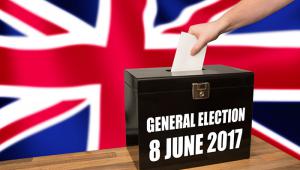No trains, no gravy
Botched timetable changes to the northern rail network had cost the economy £38m by the end of July, analysis by the Northern Powerhouse Partnership found. Passengers lost up to one million hours on Northern Rail trains alone, according to data recorded between 20 May and 30 June.
Top marks
GCSEs were graded from 1-9 rather than A* to G in England this year, under a new system, Across the country, only 732 pupils scored the top 9 grade in all their subjects. The overall pass rate rate rose 0.5 percentage points to 66.9%.
Total liability
Government liabilities have outstripped assets by £2.4trn. The Whole of Government Accounts valued 2016-17 liabilities at £4.2trn, while assets were valued at £1.9trn. Most liabilities came from borrowing (£1.3trn) and pension liabilities (£1.8trn).
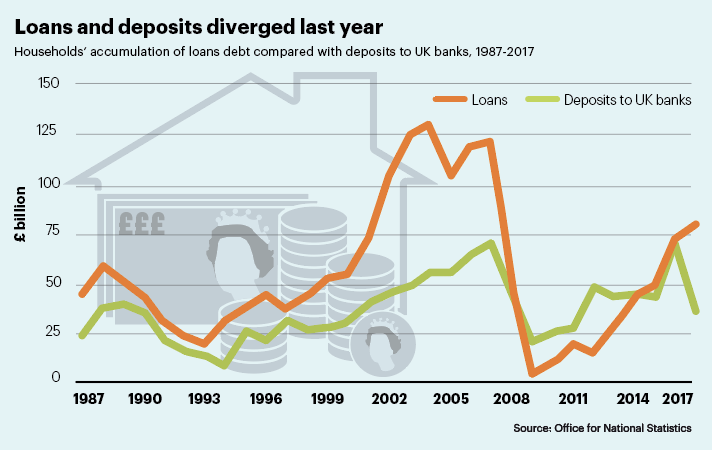 Camera shy?
Camera shy?
Half of people (49%) either support or strongly support greater use of automated road traffic enforcement systems, such as speed cameras in Britain, according to Ipsos Mori research carried out for the RAC.
The pollster tested attitudes to using cameras to monitor speed and driver behaviour at, for example, traffic lights and box junctions. It found two thirds (66%) believed they were a force for good.
The survey of over 2,000 British adults also revealed widespread scepticism about the deployment of cameras, with 62% saying they were used primarily to raise money rather than control traffic. Just under half (47%) trusted the government and other authorities to use monitoring technology in the right way.
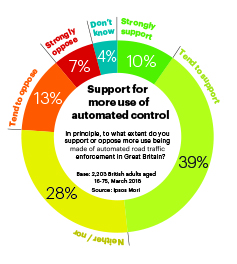 Borrowing boom
Borrowing boom
UK households continue to borrow more than they save, Office for National Statistics data shows. Accumulation of loan debt has been climbing steadily for the past six years, while bank deposits dropped sharply since 2016.
In total, households in 2017 accumulated more debt than assets for the first time since records began in 1987, the ONS said. This has been partly driven by record low interest rates, which has encouraged more borrowing and less saving.
The Bank of England base rate was raised to 0.75% in August – the highest level since March 2009. By contrast, the base rate was almost 15% in 1990.
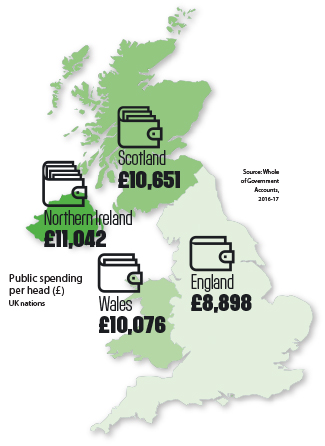 National spending shares
National spending shares
Northern Ireland enjoys the highest public spending per head of the four nations of the UK, the latest set of Whole of Government Accounts shows. Per capita spending in the province comes in at just over £11,000.
Scotland and Wales also enjoy higher per capita spending than the England average, at £10,651 and £10,076 respectively. Among English regions, spending per head is highest in London (£10,192) and lowest in the South East (£8,111).
In cash terms, spending was lowest in Northern Ireland (£20.6bn) and the North East (£25.5bn), and highest in London (£89.6bn), the South East (£73.2bn) and the North West (£68.1bn).
Party planning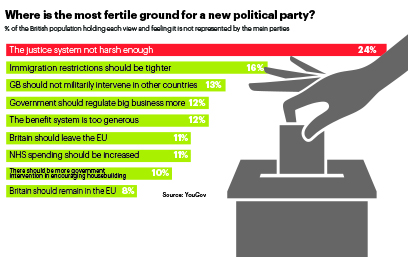
Liberal centrist hopes for a new politics were dealt a blow by some YouGov research that identified widespread support for harsher criminal justice measures, tighter immigration controls and benefit cuts. In an attempt to scope out some fertile political ground for a new party, polling showed that a quarter (24%) believe the justice system is not harsh enough, something they feel is not represented by the main parties. Sixteen per cent said they wanted stricter immigration controls, 13% less military intervention overseas, 12% said business should be more tightly regulated and the same proportion wanted the welfare system made less generous. Just 8% said they wanted the UK to remain in the EU.
 Clean air plants
Clean air plants
Fine particulate matter called PM2.5 makes up less than 2% of the physical volume of pollution removed from the atmosphere by vegetation in the UK – yet accounts for 88% of the value of avoided health damage costs.
A study produced for the Natural Capital Accounts by the Centre for Ecology and Hydrology estimated that 1.4bn kg of air pollutants were removed by woodlands, plants and grasslands in 2015. This saved the country around £1bn in health costs with 100 fewer lung and heart-related hospital admissions, 27,000 fewer life years lost and 1,900 fewer premature deaths.
PM2.5 is emitted during combustion of solid and liquid fuels. Exposure can exacerbate lung and heart conditions.
Paying more begins at 40
Those aged over 40 should pay an annual tax premium to plug the social care sector’s funding gap, the Local Government Association has argued.
A social care premium for over-40s and working pensioners is one of four LGA proposals included in its social care green paper.
Other suggestions included income tax rises across the board, increasing national insurance, means testing universal benefits and allowing council tax increases.
The LGA, which represents 370 councils in England and Wales, estimates that adult social care services face a £3.5bn funding gap by 2025, just to maintain existing standards of care.
This shortfall could be eased by charging over-40s and working pensioners an earmarked contribution, which could be added to national insurance, for example.
The recommendations echo those issued by the Commons health and local government committees in June, which suggested middle-aged and older people, as well as employers, pay in to a dedicated social insurance fund.
Image Credit | Shutterstock





